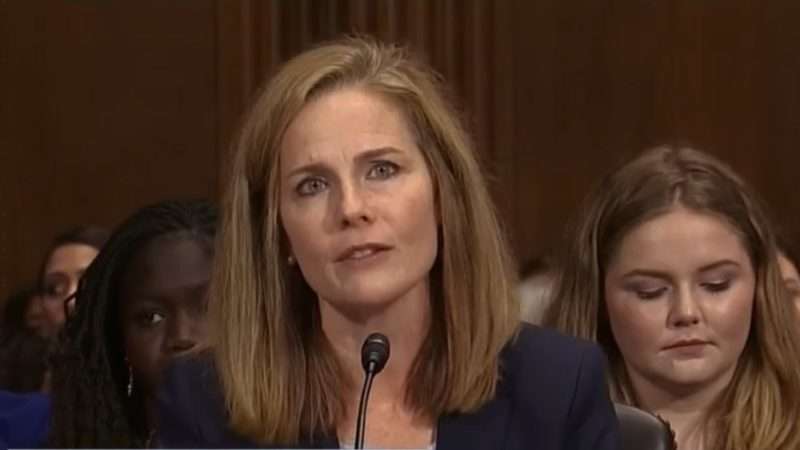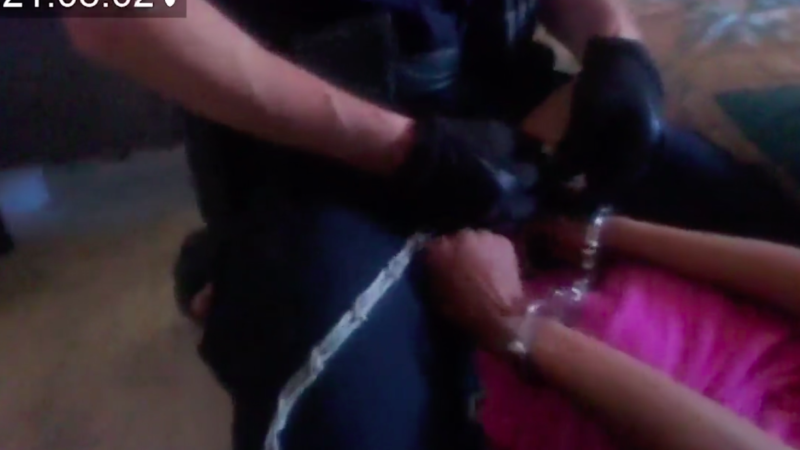For Vanessa Peoples—a 25-year-old nursing student living with her mom and kids in Aurora, Colorado—July 13, 2017, started out like any other day. But by late morning, police had hauled Peoples out of her home and hog-tied her: wrists handcuffed behind her back and tied to her legs, which were in shackles.
“You know how you tie a pig upside down and his feet are hanging from the stick?” Peoples tells Reason. “That’s how they carried me.”
Paramedics were called to the scene after Peoples said she couldn’t breathe, and they made the cops loosen the chains so they could take her to the hospital. It was there that Peoples learned the cops had dislocated her shoulder. Then they took her to jail.
Her crime? About a month earlier, Peoples’ 2-year-old son had wandered away at a family picnic in the park. He was swiftly recovered and completely unharmed—but this common, noncriminal occurrence attracted the attention of the authorities, which eventually led to a confrontation in Peoples’ home. What happened was extensively documented by police reports, body cam footage, and interviews with Peoples, her mother Patricia Russell, and Erica Grossman, a civil rights attorney who took Peoples’ case against the police.
In June 2017, Peoples and her kids—ages 2 and 4—were at a family gathering with about 15 relatives at a park. As her cousin was leaving, Peoples’ younger son followed the cousin toward her car. A passerby saw the seemingly unattended child and grabbed him. Peoples came over and demanded the woman let him go.
“I’m telling her, ‘ma’am, that’s my son,'” Peoples says. “She’s refusing to let go of him and talking on the phone. I didn’t know she was talking to the police.”
The cops arrived a few minutes later, but the woman still refused to relinquish the child, according to Peoples. The cops then demanded proof that Peoples was indeed the boy’s mother, even though her son was calling her mom and reaching for her, Peoples recalled.
Other relatives came over to support Peoples. Finally, the other woman released the child. The cops left Peoples with a ticket for child neglect and departed.
How long before Peoples noticed her son was missing and went to find him? About a minute, according to Peoples.
Even if the boy had wandered off, this is something that happens to many parents at some point in their lives. In England, a doting mom and dad took their child to a pub and later left in their separate cars. Their daughter came out of the loo and found they were gone. Her mom was not investigated for neglect, nor was her dad: David Cameron, who was prime minister at the time.
As a family defense attorney, I’ve had my fair share of neglect claims just like these that land parents in the middle of a child services investigation. Cooler heads usually prevail and the investigations are closed pretty quickly. Middle-class parents often get the benefit of the doubt. Peoples—a low-income African-American woman—enjoyed no such luck.
Clearly, the authorities weren’t too alarmed for the safety of Peoples’ kids: It was a month before a caseworker came to conduct a follow-up well-being check. That’s when the trouble really started.
The caseworker knocked on the door for a while and received no answer. Peoples had just given the kids their baths, and they were in the basement with her where she was doing some laundry. She hadn’t dressed them yet, and when the kids ran upstairs, the caseworker saw one of them naked and leaning out the first floor window.
Concerned the kids might be alone, the caseworker called her supervisor and was told to contact the police. Soon, three cops arrived at the house.
“The front door was unlocked,” wrote the police in their report. They announced that they were coming in and then entered the single-family home without either permission or a warrant. They also drew their guns.
“As I was going up the stairs, the sergeant has a gun pointed at my head, saying, ‘This is the Aurora Police Department!'” says Peoples.
Unless there is an emergency—imminent danger to the kids—the government must obtain a search warrant to enter a home without the homeowner’s consent. Nothing in Peoples’ file, however, suggested there was enough evidence for a warrant. And once she came upstairs, startled and unarmed, any immediate concern that perhaps there was no one home with the kids evaporated. The cops didn’t need to stick around.
Nevertheless, they asked Peoples why she hadn’t answered the door. According to the bodycam footage, she politely replied that she was hard of hearing in one ear. The cops noted this point as a “concern,” along with the fact that the children were undressed, the front window’s screen was loose, and the door unlocked. They also noted that the family had “little food in the pantry.”
At that point, Peoples called her mother, Russell, urging her to hurry home from her nearby doctor’s appointment.
According to the bodycam footage, the home visit was nearly completed by the time Russell arrived, angry and demanding that the cops and the caseworkers leave. From there on, things became chaotic as police and caseworkers swarmed back into the house from the front doorway and started issuing orders.
Russell tried to go into a room to fix the children’s clothing, attempting to close the door behind her. But the police did not want to leave her alone with the kids, and a struggle began.
“I told her I need to go in the room because she could not be in the room alone with the children,” wrote an officer in the report. “She attempted to close the bedroom door on me again. I then pushed past her.” The officer took hold of Russell and wrote that she “started to calm down.”
Meanwhile, Peoples became upset with what was happening out of her view, shouting, “It’s my house, my kids, that’s my mom!” over and over again. She disregarded the cops’ orders to stay back and attempted to move past an officer and join her mother in the bedroom. The confrontation then turned physical. One officer put his hand on her throat, according to the bodycam footage and the officer’s own report. The officers then pushed the 107-pound woman face-first into a bean bag chair to stop her from moving.
Two or three cops pinned her as she began to flail, screaming for her mother. At that point, the cops decided to hobble her. Hobbles are a set of hand and ankle cuffs that can be attached to each other from behind, hog-tying the person.
“My hands are handcuffed and tied to my feet,” Peoples recalls. “My stomach and face were toward the ground. When they were in the process of handcuffing and hog-tying me, they dislocated my shoulder. I was telling them, ‘There’s something wrong with my arm. I’m in a lot of pain.'”
The cops carried Peoples outside and placed her in the backseat of a police car as she screamed “I can’t breathe.” At that point, they agreed to call for medical assistance for her, because she was having trouble breathing, suffering from an injured shoulder, and in pain from the restraints. Eventually, the police officers discussed removing the hog-ties, but took her out of the car and placed her on the grass in order to do so. The restraints remained in place until medics arrived.
Inside the house, the inconsolable screams of Peoples’ 4-year-old calling for his mother are audible on some of the bodycam footage. A cop is heard repeating, “Mommy’s okay,” as Russell begged to go out to see for herself, only to be told that her own agitation “is not helping.”
Recall that this all began when caseworkers came to the home just to make sure the kids were fine following the incident in the park nearly a month before.
The medics decided to transport Peoples to a hospital where she was given a sling, ice, and ibuprofen. Her good arm, and a leg, were cuffed to the bed “so I couldn’t go anywhere,” she says. After the examination, she was taken to the police department, booked, and placed in a jail cell. Her mother bailed her out around midnight.
Shortly before the police had hog-tied her, Peoples had managed to call her husband, Tevin Hike, to come help with the kids. He left his electrician’s job and got there as quickly as he could. The police stopped Hike outside the home. He started to question the officers about why Peoples had been arrested, apparently “unaware that he was about to suffer the same fate,” noted one of the police reports. The cops had found an outstanding warrant for Hike—for missing a court date for a speeding ticket.
As two officers approached Hike to handcuff him, he tried to go into the house. Officers warned him “not to fight,” and notified him of the warrant against him. When Hike appeared to the cops to be trying to escape, one of them wrapped his arm around his neck, and pulled him to the ground in front of the house. The police report claimed that he had “resisted with all his might” before being placed in a cop car. On the bodycam video, one of the officers commented that he would be charging Hike with “as much as he can charge.” Another officer joked that “maybe we should just take the whole house to jail.”
Several officers pressed the caseworker to take the kids into foster care then and there. But she pushed to allow the kids to stay with Russell, noting “foster care isn’t good for kids.” As they were leaving, a cop handed Russell her own ticket for obstructing justice.
By the time Hike and Peoples had been taken from their home, at least seven police officers, as well as two caseworkers and a team of paramedics, had either come into their home or provided backup outside, lining the street with their cars and an ambulance. The sheer number of police and the detailed reports of how they subdued Peoples and Hike read as if it were a raid of El Chapo’s headquarters.
Peoples ultimately took a plea deal, which allowed her to avoid jail time. She had to accept regular visits from a social worker, complete a year of probation, pay a $200 fine, and enroll in parenting classes. She completed all the requirements and was released from probation two months early. But she still has reckless endangerment of a child on her record, which may hurt her ability to get a job when she finishes her nursing program.
Peoples’ case, illustrating the extreme force used in the course of a routine well-being check, is unusual insofar as it is thoroughly and clinically documented by seven different police officers. (Peoples and her attorney never received the social services file, and the primary caseworker could not be reached as she no longer works with the Adams County Social Services Department.)
That using this type of restraint—a hog-tie—was unremarkable seems apparent from the female supervising officer’s matter-of-fact comments: “I checked [Peoples’] hobble and handcuffs. The hobble was put on correctly with a waist chain and leg restrict. Each chain and the leg restraint was hooked with a handcuff. I did notice the waist chain was tight,” and did “advise we needed to loosen the waist chain.”
The application of hobbles has been known for at least 20 years to cause significant breathing problems, sometimes resulting in asphyxiation and death. Peoples warned the cops she had asthma, even as they kept her tied up.
What is also unusual about Peoples’ story is that she eventually secured legal representation to sue the Aurora Police Department for the injuries she experienced. The threatened suit settled out of court.
I have worked as a child protection system reform lawyer for over 35 years. I founded and led the Chicago-based Family Defense Center from 2005 through 2017, where I represented hundreds of parents accused of inadequately supervising their kids under the law’s vague standards of proof and overbroad policies. Indeed, one of my lawsuits led the state to clear over 26,000 parents who had been listed as child neglecters for allegedly creating an “injurious environment” for their kids—a charge so vague and boundless that the Illinois legislature had expressly removed it from Illinois law decades before the child protection agency started to use it as a catch-all. The assumption that parents are “guilty until proven innocent” abounds in the child protection system, along with demands that parents must prove their constant attentiveness to their children or risk losing their kids to the foster care system.
Such demands—ones that even Britain’s Prime Minister couldn’t satisfy if pressed—especially impact communities of color. Fully 53 percent of African-American kids will be investigated by child protective services in their lifetime. Countless black parents will be compelled at some point to defend their parenting against an abuse or neglect accusation coming at them from a stranger, professional, or neighbor. It is the stop-and-frisk of black parenthood.
And often, as in Peoples’ case, it is not just child services that get involved, but also the police. Both child protection authorities and law enforcement have the power to judge parenting and apply sanctions. Caseworkers often call cops when mothers are reluctant to open their doors. For Peoples, it was the call to police at the park that led to the caseworker’s visit, which, in turn, led to the call for police backup.
Often the concerns balloon once the family is put under a microscope. Though she was at Peoples’ home only because of the incident in the park, the caseworker soon expressed concern that the child could fall out the window. She pressed this point, insisting Peoples admit she was insufficiently attentive.
Grossman, a civil rights lawyer with the Denver firm of Holland, Holland, Edwards and Grossman, took Peoples’ case because of her firm’s “visceral reaction” to seeing, on the bodycam footage, “a white man sitting on top of a black woman while tying her up like an animal.”
“They were using a level of military force like they’re at a huge crime scene instead of a child [well-being] check,” Grossman tells Reason. “They did this in front of her two children without a hint of concern about the trauma the children would experience, in the name of making sure their mother was attentive enough.”
The lawsuit that Grossman prepared was settled with the police even before it was filed. Peoples’ dislocated shoulder and the hog-tie made a presumptive case of excessive force.
But most home visits by child protective services leave parents without recourse even when parents feel the authorities have overstepped their bounds. If not for the lawsuit, Peoples’ case, too, would have never been exposed.
Dorothy Roberts, a University of Pennsylvania Professor of Law and author of the seminal work, “Shattered Bonds: The Color of Child Welfare,” has argued against expanding mandatory reporting laws and home-visiting programs. “Even well-meaning recommendations to deploy social workers to conduct ‘wellness checks’ in homes will likely result in…expanding the state’s monitoring and disruption of families,” especially African-American families, she writes.
The vast majority of parents subject to well-being checks are struggling to feed, clothe, and house their families. Poverty is often mistaken for neglect. Well-being checks, like the ones Peoples was required to continue to accept after her arrest, provide no concrete help, instead creating another hurdle parents have to meet in order to be left alone. Social service interventions that actually provide support instead of judgment would help keep families together, rather than tearing them apart.
The government’s well-being check on Peoples’ children left them with nightmares and a fear that the cops could come, tie up, and take away their parents.
“The cops forgot we were human,” says Peoples.

from Latest – Reason.com https://ift.tt/36gLtdh
via IFTTT



